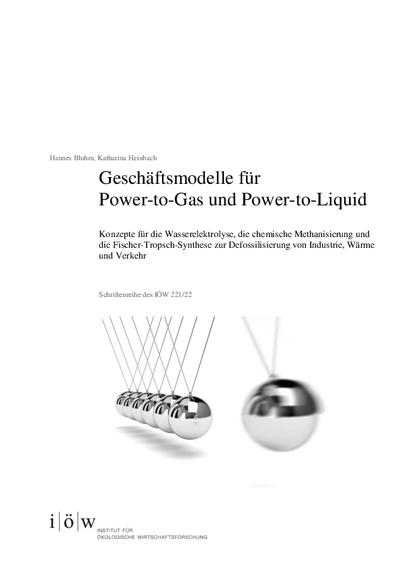Business Models for Power-to-Gas and Power-to-Liquid Concepts for water electrolysis, chemical methanation and Fischer-Tropsch synthesis for the defossilisation of industry, heat and transportation
With the Amendment of the Climate Change Act 2021, Germany has set itself the goal to reach greenhouse gas neutrality by 2045. This requires defossilisation in all sectors and thus a comprehensive transformation of the energy system and industry. Power-to-X technologies use electricity to supply products and provide services and are thus both sector couplers and energy storage solutions. The range of technologies and fields of application for Power-to-X (PtX) is wide. At the same time, renewable electricity is a limited resource. This raises the question as to which PtX technologies – and associated business models – are promising for contributing in the best possible way to achieving climate targets and making the transformation process in the German economy sustainable – especially in the industry sector.
The research project "ProPower: System Analysis Power2Products" dealt, among other things, with potential business models and the economic evaluation of selected PtX processes, the results of which are presented in this IÖW Text Series. The project was funded by the Federal Ministry for Economic Affairs and Energy (BMWi). Prototypical business models for implementation in Germany are described and evaluated for three already technologically mature processes: proton exchange membrane electrolysis and chemical methanation in the field of Power-to-Gas, and Fischer-Tropsch synthesis in the field of Power-to-Liquid. Based on the analyses and in dialog with representatives of companies and associations, central barriers for a PtX market introduction and options for action were derived. The latter are directed at the economy and at political decision-makers. With a view to the context of the energy transition, the international environment, and the environmental impacts of PtX technologies, overarching conclusions are drawn and recommendations formulated.



